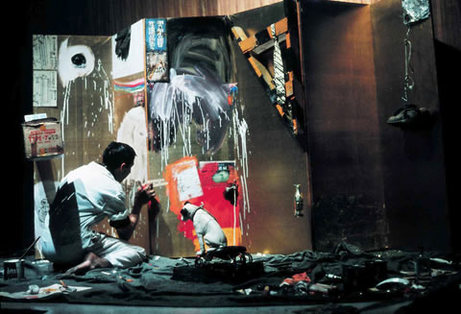-
today's events
Bookshop Sale Feb 21, 2026 - Feb 28, 2026
Gallery and Bookshop Hours Chicago Architecture Biennial Jan 01, 2026 - Feb 28, 2026
-
upcoming event
-
past events
Zosha Warpeha Lampo Performance Series Feb 21, 2026
End-of-year Bookshop Sale Dec 13, 2025 - Dec 20, 2025
Eve Aboulkheir Lampo Performance Series Dec 06, 2025 Performance
Leila Bordreuil and Lee Ranaldo Lampo Performance Series Nov 08, 2025
Roc Jiménez de Cisneros Lampo Performance Series Oct 11, 2025
Madlener House
4 West Burton Place
Chicago, Illinois 60610
Telephone: 312.787.4071
info@grahamfoundation.org

Robert Rauschenberg creating the combine 'Gold Standard in Twenty Questions to Bob Rauschenberg,' Sogetsu Art Center, Tokyo, November 28, 1964. Photograph by Masaaki Sekiya. ©2011 Masaaki Sekiya. All rights reserved. Courtesy of the Solomon R. Guggenheim Museum, NY.
Please join us for a panel discussion exploring the emerging role of artist-endowed foundations as a force in cultural philanthropy and in the stewardship of contemporary art and design.
Research conducted by the Aspen Institute's National Study of Artist-Endowed Foundations, the first effort to examine the field of private foundations endowed by visual artists in the U.S., has documented more than 355 foundations, many created in the past two decades, holding $3.5 billion in assets, $2 billion of this in the form of art and intellectual property. With higher profile foundations bearing names such as Lichtenstein, Warhol, and Rauschenberg, these organizations make grants to nonprofits and to artists and scholars. They steward art collections and archives, contribute artwork to museums, operate artist residency centers, care for architecturally significant properties, and conduct cultural and educational programs. In 2010, members of the field made $70 million in aggregate grants. Among key trends documented by the Study is a rise in the number of foundations associated with architects and designers. The Study’s report may be viewed online at www.aspeninstitute.org/psi/a-ef-report.
Panelists include Sarah Herda, Director of the Graham Foundation for Advanced Studies in the Fine Arts and former director/curator of the Storefront for Art and Architecture; Christy MacLear, Executive Director of Robert Rauschenberg Foundation and former inaugural director of the Philip Johnson Glass House, a property of the National Trust for Historic Preservation; Stephen K. Urice, Professor of Law, University of Miami School of Law, and co-author of the standard art law casebook, Law, Ethics and the Visual Arts, Kluwer Law International (5th Ed. 2007); and Christine J. Vincent, Study Director, The Aspen Institute’s National Study of Artist-Endowed Foundations and former deputy director for media, arts and culture at the Ford Foundation. The panel will be moderated by Angelique Power, Senior Program Officer, Culture, the Joyce Foundation.
The Graham Foundation for Advanced Studies in the Fine Arts was created in 1956 by a bequest from architect Ernest R. Graham (1866–1936). The Foundation makes project-based grants to individuals and organizations and produces public programs to foster the development and exchange of diverse and challenging ideas about architecture and its role in the arts, culture, and society. The Foundation’s programs can be viewed online at www.grahamfoundation.org.
Robert Rauschenberg Foundation was formed by Robert Rauschenberg (1925-2008) in 1990 to promote awareness of the causes and groups close to his heart. Activities of the Foundation include managing the artwork, exhibition and scholarship of Robert Rauschenberg as well as the growth of the philanthropy programs that intersect art and issues central to the artist’s concerns during his lifetime. The Foundation’s programs are detailed online at www.rauschenbergfoundation.org
The Aspen Institute’s National Study of Artist-Endowed Foundations has been supported by a consortium of national and regional donors whose members include the Joyce Foundation.
Copyright © 2008–2026 Graham Foundation. All rights reserved.